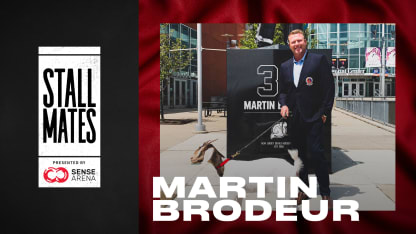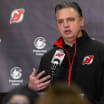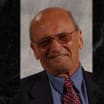"Actually, a little bit," he professed. Marty recalled it was Danius Zubrus who perhaps got the most grief from his teammates when he found himself pressing play on his music.
"He had a little bit of techno music there, from Europe," the Hall of Famer remembers. You could tell it wasn't a locker room favorite, or at least not a Marty favorite based on how he told the story. But it didn't end there.
"We had guys that (went) overboard with the country in the morning. You'd fall asleep."
So, techno seemed like a no-go, and country wasn't the favorite. It's hard to please everyone in a locker room.
"There was never any happy medium. If it was somewhere we could never find it. You know, we are hockey players. We just like to complain about everything to each other anyway."
And especially when Claude Lemieux was around. Although with his status in the locker room, maybe the complaints were kept to themselves.
"He thought he was good," Brodeur imparted.
Not having those headphones around the locker room like we tend to see these days, Brodeur remembers a specific moment where he saw a teammate bring in headphones one of the first times. It wasn't the norm to wear headphones in the locker room.
"Now it's more normal, kids are having their headphones on and listen to music and all that. We didn't really do that, but we traded for Brad Lukowich. I don't remember what year, and he came in from Dallas. And he's the first one that during his preparation, he would put his headphones on. And he would do like the air drum and like playing the air guitar. And we're like sitting there like, 'Oh my god, what's going on over there.' So, that's the first guy that we saw. So a little different than what we were used to."
And "talking to each other" may have also given Brodeur added and early insight into one of his stall mates: Kevin Weekes.
Weekes sat next to Brodeur for two seasons while with the Devils and learning that Kevin was moving on to broadcasting after his NHL career came as no surprise at all to Marty, who always had that inkling he would head that direction with the insight he got from two seasons sitting next to one another.
"Kevin was a really fun guy," Brodeur recalled, "You knew right away what he was going to do after hockey, you knew he was going to do TV. He would sit there and just pronounce all the names on the board.
"He would be full of commentary all the time, about everything. You could tell he was just so polished, not even doing (TV) yet. But he was still playing hockey."
I wondered what it would have then been like to sit next to Marty. Surely a goaltender of his caliber, of his success would have his own superstitions. But the truth is, he wasn't. He described himself as pretty easy-going, an effort to maximize his own success.
"I saw guys' little quirks here and there. And I was always afraid to stick with too many of them and get invaded by all these little things you need to do to have success. I minimized a little bit of that stuff because, you know, if you think about players, they sit on the bench and they're able to interact with each other. With a goalie, you're in your head a lot."
Can't argue with that. Marty knew and Marty delivered.



















